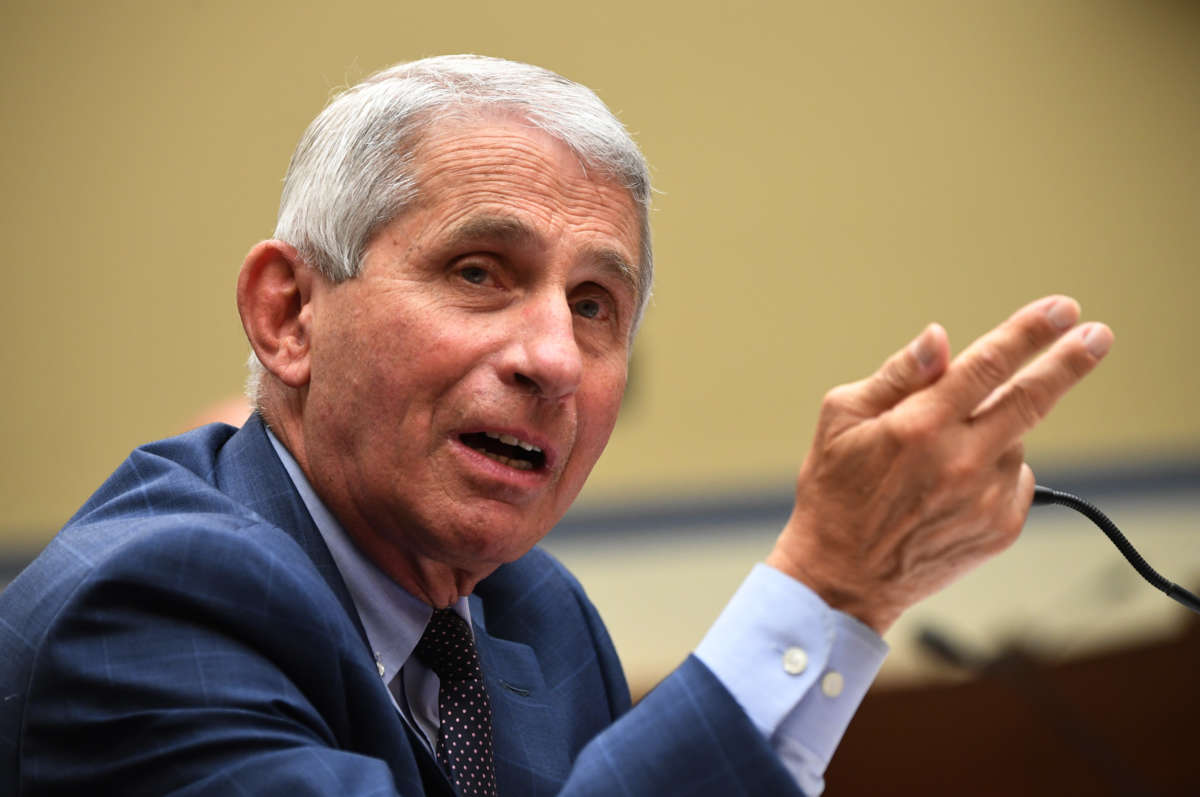Honest, paywall-free news is rare. Please support our boldly independent journalism with a donation of any size.
Anthony Fauci, who serves as director of the National Institute of Allergy and Infectious Diseases and is a member of the White House’s coronavirus task force team, rebuked Sen. Rand Paul (R-Kentucky) during Senate testimony on Wednesday regarding the coronavirus pandemic after the lawmaker “misconstrued” facts about COVID and the response to it from officials in New York.
Senator Paul expressed misgivings over Fauci’s praise for how New York Gov. Andrew Cuomo, a Democrat, and other officials in the state had responded to the pandemic.
“New York had the highest death rate in the world, how can we possibly be jumping up and down and saying, ‘Oh, Governor Cuomo did a great job,'” Paul said to Fauci.
Fauci responded by telling Paul that he was wrong in his comments.
“No, you’ve misconstrued that, senator. And you’ve done that repetitively in the past,” the infectious diseases expert said.
"You misconstrued that, Senator. And you've done that repetitively in the past." — Fauci is out of patience with Rand Paul pic.twitter.com/6xRoO19ZYL
— Aaron Rupar (@atrupar) September 23, 2020
Fauci elaborated on the actual situation in New York, and why some praise was warranted to political leaders there.
While conceding that “some mistakes” were made at the beginning of the crisis, Fauci implied that the way New York officials responded should be emulated elsewhere — particularly since the state has seen lower daily testing rates recently as a result of following guidelines offered by the Centers for Disease Control and Prevention (CDC) on how to prevent the spread of COVID-19.
“Right now, if you look at what’s going on right now, the things that are going on in New York to get their test positivity 1 percent or less, is because they are looking at the guidelines that we have put together of the task force of the four or five things, of masks, social distancing, outdoors more than indoors, avoiding crowds, and washing hands,” Fauci said.
Paul interrupted, however, to propose a different theory.
“Or [New York residents] have developed enough community immunity that they’re no longer having the pandemic, because they have enough immunity in New York City,” Paul suggested.
“I challenge that,” Fauci responded, blasting Paul for “not listening” to what CDC Director Robert Redfield had said earlier.
“In New York, it’s about 22 percent,” Fauci said, referring to the number of New York City residents who are believed to have contracted the disease at some point over the last several months. “If you believe 22 percent is herd immunity, I believe you are alone in that.”
Herd immunity for a number of diseases is typically achieved through vaccinations, and results when enough people in a community have developed antibodies to limit the spreading of an illness. But absent a vaccination for COVID-19, some have suggested allowing the disease to run its course in order to achieve herd immunity, a process that some advisers in President Trump’s orbit have proposed implementing, but which many critics have likened to being akin to the practice of eugenics.
“It is hard not to read eugenic implications in this kind of thinking: The ‘herd’ will survive, but for that to happen, other ‘weaker’ members of society need to be sacrificed,” anthropologists and professors Vito Laterza and Louis Philippe Romer noted in an opinion article for Al Jazeera.
It’s difficult to disagree with that expert opinion on how herd immunity plays out, given that Black, Latino and Indigenous communities have suffered a disproportionate number of COVID-realted deaths. To date, more than 200,000 Americans have died from coronavirus after only about 1 in 10 have contracted it, according to figures from Redfield, who testified on Wednesday at the same Senate hearing.
“More than 90 percent of the population remains susceptible,” Redfield said to lawmakers, adding that some parts of the country have had higher rates, but none that reach the threshold needed to think the disease cannot do more harm by spreading to others.
“It varies in different geographic parts from states that have less than 1 percent with evidence of previous infection, to some that have more than 15, 20 and one as high as 24 percent,” Redfield added.
Trump is silencing political dissent. We appeal for your support.
Progressive nonprofits are the latest target caught in Trump’s crosshairs. With the aim of eliminating political opposition, Trump and his sycophants are working to curb government funding, constrain private foundations, and even cut tax-exempt status from organizations he dislikes.
We’re concerned, because Truthout is not immune to such bad-faith attacks.
We can only resist Trump’s attacks by cultivating a strong base of support. The right-wing mediasphere is funded comfortably by billionaire owners and venture capitalist philanthropists. At Truthout, we have you.
Our fundraising campaign is over, but we fell a bit short and still need your help. Please take a meaningful action in the fight against authoritarianism: make a one-time or monthly donation to Truthout. If you have the means, please dig deep.
